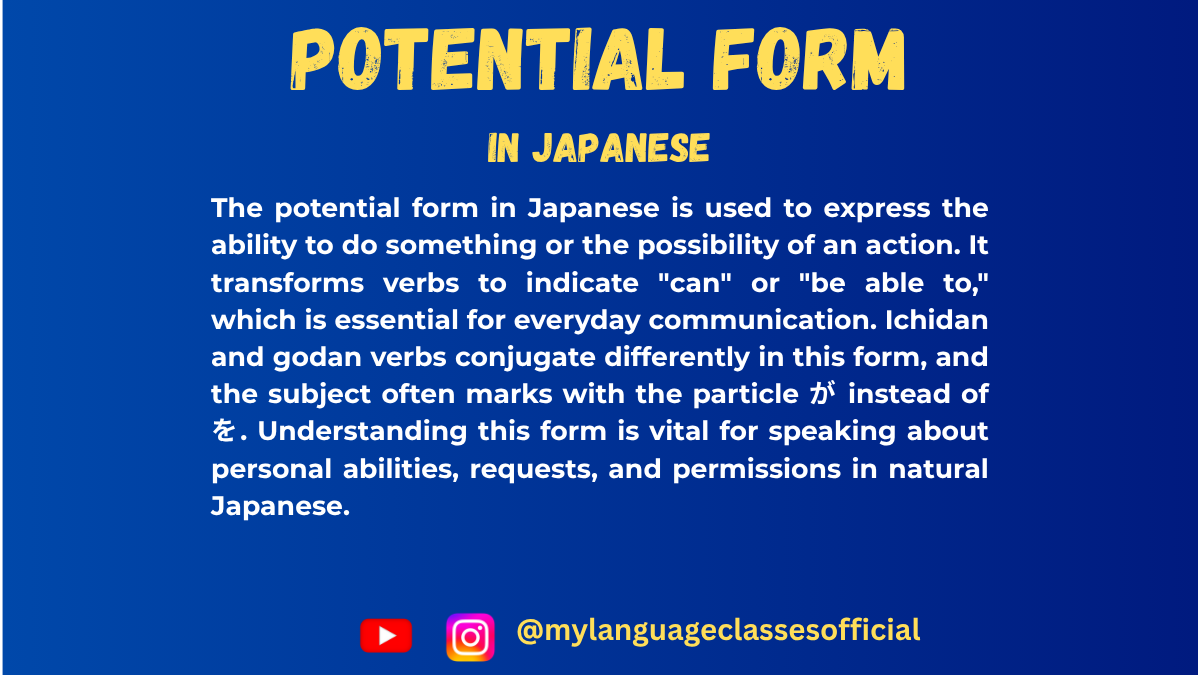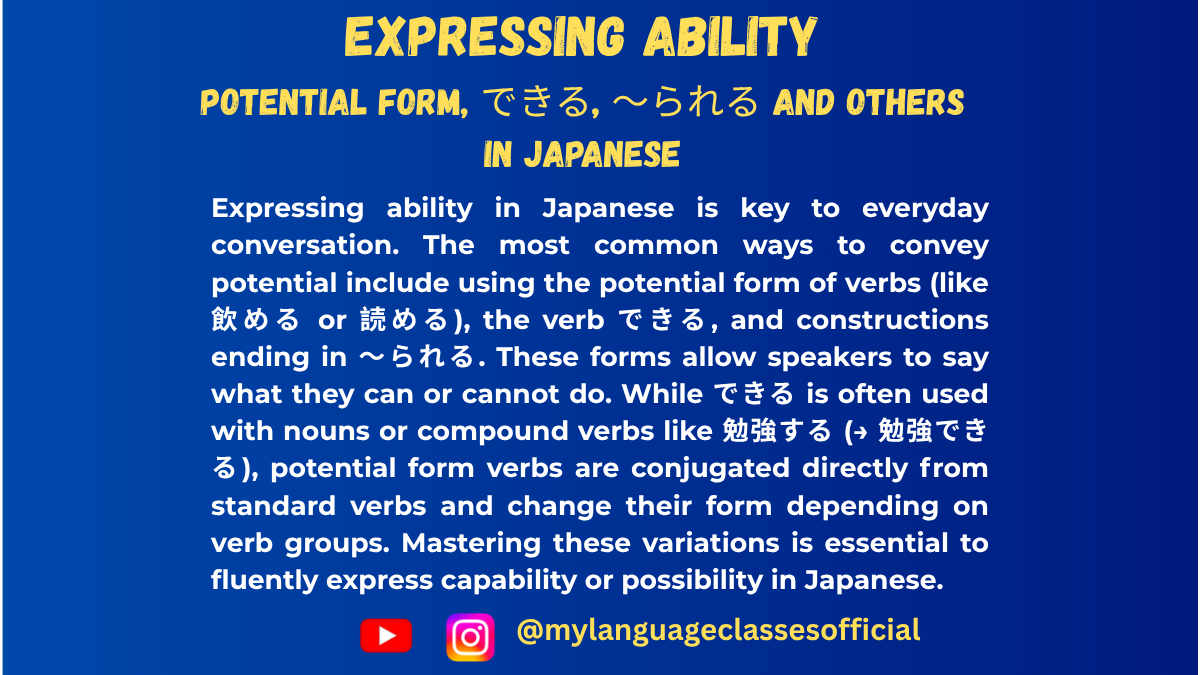Your cart is currently empty!
Tag: how to say can in Japanese
-

Potential Form of Verbs in Japanese | My Language Classes
Understanding Potential Form
The potential form (可能形, かのうけい) of verbs in Japanese expresses the ability or possibility to do something. This form is widely used in everyday conversations to talk about what someone can or cannot do.
Usage of Potential Form in Different Situations
- Expressing Ability
- 日本語を話せます。(I can speak Japanese.)
- Expressing Capability
- ここから富士山が見えます。(You can see Mount Fuji from here.)
- Expressing Permission
- この図書館では本を借りられます。(You can borrow books in this library.)
- Expressing Physical or Situational Possibility
- 今日は忙しいので、映画に行けません。(I am busy today, so I can’t go to the movies.)
- Expressing Potential in Hypothetical Scenarios
- 彼が来たら、もっと話せると思います。(If he comes, I think I will be able to talk more.)
- Asking About Ability
- ピアノが弾けますか? (Can you play the piano?)
- Denying Capability
- 漢字が読めません。(I can’t read kanji.)
- Expressing Limited Ability (Using なら)
- スペイン語なら話せます。(If it’s Spanish, I can speak it.)
Formation of Potential Form
Japanese verbs are categorized into three groups, and the potential form is formed differently for each.
Group 1 (Godan Verbs / 五段動詞)
For 五段動詞 (Godan verbs), replace the final う sound with える.
Dictionary Form Potential Form Example Sentence 1 Example Sentence 2 書く (to write) 書ける 日本語が書けます。(I can write in Japanese.) 漢字が書けません。(I can’t write kanji.) 行く (to go) 行ける 明日、海に行けます。(I can go to the beach tomorrow.) 東京には行けません。(I can’t go to Tokyo.) 話す (to speak) 話せる 日本語が話せますか?(Can you speak Japanese?) 彼は英語が話せません。(He can’t speak English.) 飲む (to drink) 飲める お酒が飲めますか?(Can you drink alcohol?) ビールが飲めません。(I can’t drink beer.) 泳ぐ (to swim) 泳げる 彼は速く泳げます。(He can swim fast.) 海では泳げません。(I can’t swim in the sea.) 買う (to buy) 買える この店でケーキが買えます。(You can buy cakes at this shop.) 今日は買えません。(I can’t buy it today.) 作る (to make) 作れる 美味しい料理が作れます。(I can make delicious food.) パンは作れません。(I can’t make bread.) Group 2 (Ichidan Verbs / 一段動詞)
For 一段動詞 (Ichidan verbs), replace る with られる.
Dictionary Form Potential Form Example Sentence 1 Example Sentence 2 食べる (to eat) 食べられる 何でも食べられます。(I can eat anything.) 魚が食べられません。(I can’t eat fish.) 見る (to see) 見られる この映画が見られます。(You can watch this movie.) 明日は見られません。(I can’t watch it tomorrow.) 着る (to wear) 着られる 和服が着られます。(I can wear a kimono.) その服は着られません。(I can’t wear those clothes.) 起きる (to wake up) 起きられる 朝6時に起きられます。(I can wake up at 6 AM.) 今日は早く起きられません。(I can’t wake up early today.) 忘れる (to forget) 忘れられる 昨日のことが忘れられます。(I can forget about yesterday.) その話は忘れられません。(I can’t forget that story.) Group 3 (Irregular Verbs / 不規則動詞)
The two irregular verbs in Japanese have unique potential forms.
Dictionary Form Potential Form Example Sentence 1 Example Sentence 2 する (to do) できる サッカーができます。(I can play soccer.) 今日は運動ができません。(I can’t exercise today.) 来る (to come) 来られる 彼は会議に来られます。(He can come to the meeting.) 明日は来られません。(I can’t come tomorrow.) More Example Sentences
- 私は日本語が話せます。
(I can speak Japanese.) → [Godan Verb: 話す → 話せる] - この店ではケーキが買えます。
(You can buy cakes at this shop.) → [Godan Verb: 買う → 買える] - 今日は早く起きられません。
(I can’t wake up early today.) → [Ichidan Verb: 起きる → 起きられる] - この映画はネットで見られます。
(You can watch this movie online.) → [Ichidan Verb: 見る → 見られる] - ピアノが弾けますか?
(Can you play the piano?) → [Godan Verb: 弾く → 弾ける] - 彼は速く泳げます。
(He can swim fast.) → [Godan Verb: 泳ぐ → 泳げる] - 明日は学校に行けません。
(I can’t go to school tomorrow.) → [Godan Verb: 行く → 行ける] - この本は図書館で借りられます。
(You can borrow this book from the library.) → [Ichidan Verb: 借りる → 借りられる] - サッカーができますか?
(Can you play soccer?) → [Irregular Verb: する → できる] - 彼は明日の会議に来られます。
(He can come to tomorrow’s meeting.) → [Irregular Verb: 来る → 来られる]
These examples cover various real-life situations where the potential form is commonly used. Let me know in comment if you need more examples!
Fill in the Blanks Exercise:
- 日本語が____ますか? (Can you speak Japanese?)
- この映画はネットで____ます。 (You can watch this movie online.)
- 今日は早く____ません。 (I can’t wake up early today.)
- 美味しい料理が____ますか? (Can you make delicious food?)
- ここでは写真を____ません。 (You can’t take pictures here.)
- 彼女はピアノが____ません。 (She can’t play the piano.)
- この店ではケーキが____ます。 (You can buy cakes at this shop.)
- その本が____ますか? (Can you read that book?)
- 彼は会議に____ますか? (Can he come to the meeting?)
- お酒が____ません。 (I can’t drink alcohol.)
Answers
- 話せ
- 見られ
- 起きられ
- 作れ
- 撮れ
- 弾け
- 買え
- 読め
- 来られ
- 飲め
Notes on Usage
- Shortened Form of Ichidan Verbs: In casual speech, some people drop ら from られる and say 食べれる, 見れる, etc. However, this is considered informal and not grammatically standard.
- Using を or が: When using potential form, the object marker を is often replaced with が.
- Correct: 漢字が書ける。
- Acceptable (less common): 漢字を書ける。
- Negative Form: Add ない to the potential form.
- 漢字が読めない (I can’t read kanji.)
- Polite Form: Add ます to the potential form.
- 漢字が読めます (I can read kanji.)
Mastering the potential form will help you express what you can and cannot do in Japanese fluently! Try using it in daily conversations to reinforce your understanding. 頑張ってください! (Good luck!)
If you enjoyed this lesson, be sure to check out more posts like this on my blog at My Language Classes. Don’t forget to subscribe my YouTube channel and follow me on Instagram for the latest language learning tips and lessons. Leave a comment below to share your thoughts, or ask any questions you have about nouns.
Happy learning! 😊
- Expressing Ability
-

Expressing Ability in Japanese | My Language Classes
How to Express Ability in Japanese
When learning Japanese, expressing ability is an essential skill. Japanese uses specific grammatical structures to indicate whether you can do something. These expressions differ depending on the type of verb, politeness level, and context. This blog post will cover all the patterns and nuances you need to know.
1. Using Potential Form (可能形, Kanoukei)
The potential form of verbs is the most common way to express ability in Japanese. This form modifies the verb to mean “can” or “be able to.”
Formation Rules:
- Group 1 Verbs (五段動詞): Change the last “u” sound to its corresponding “e” sound and add -る.
- 書く (kaku, to write) → 書ける (kakeru, can write)
- 飲む (nomu, to drink) → 飲める (nomeru, can drink)
- Group 2 Verbs (一段動詞): Simply replace -る with -られる.
- 食べる (taberu, to eat) → 食べられる (taberareru, can eat)
- Irregular Verbs:
- する (suru, to do) → できる (dekiru, can do)
- 来る (kuru, to come) → 来られる (korareru, can come)
Usage in Sentences:
- ピアノを弾けますか? (Piano o hikemasu ka?)
Can you play the piano? - 日本語が話せます。 (Nihongo ga hanasemasu.)
I can speak Japanese.
Note: For Group 2 verbs, the shortened form 食べれる is often used in casual speech, but it may be considered grammatically incorrect in formal contexts.
2. Using the Verb できる (Dekiru)
できる is a versatile verb that expresses general ability or possibility. It is often used with nouns or “nominalized verbs” (verbs turned into nouns).
Formation Rules:
- [Noun] + ができる
- スキーができる (Sukī ga dekiru) → I can ski.
- [Verb in dictionary form] + ことができる
- 本を読むことができる (Hon o yomu koto ga dekiru) → I can read books.
Usage in Sentences:
- 私は泳ぐことができません。 (Watashi wa oyogu koto ga dekimasen.)
I cannot swim. - 新しいゲームができる。 (Atarashii geemu ga dekiru.)
I can play a new game.
Tip: Use できる for broader abilities or formal contexts, while the potential form of verbs is more direct.
3. Expressing Inability with できない and Potential Form
The negative forms of できる and potential verbs are used to express inability.
- 書けない (kakenai, cannot write)
- 飲めない (nomenai, cannot drink)
- できない (dekinai, cannot do)
Examples:
- 車を運転できません。 (Kuruma o unten dekimasen.)
I cannot drive a car. - 漢字が読めない。 (Kanji ga yomenai.)
I cannot read kanji.
4. Using Expressions with 〜られる in Daily Conversation
In casual conversation, 〜られる forms often sound softer and less assertive. You can use them to express possibilities or abilities politely.
Examples:
- この本、読めますか? (Kono hon, yomemasu ka?)
Can you read this book? - 外国語は難しいけど、頑張れば話せるよ! (Gaikokugo wa muzukashii kedo, ganbareba hanaseru yo!)
Foreign languages are hard, but you can speak them if you try!
5. Using ~ことがある to Talk About Situational Ability
You can also use ~ことがある to describe situations where something is possible or permissible.
Examples:
- 会議室を使うことができますか? (Kaigishitsu o tsukau koto ga dekimasu ka?)
Is it possible to use the meeting room? - この公園で遊ぶことができます。 (Kono kōen de asobu koto ga dekimasu.)
You can play in this park.
6. Things to Keep in Mind
- Politeness Levels:
Adjust the verb endings according to the situation. For example:- Polite: 話せます (hanasemasu)
- Casual: 話せる (hanaseru)
- Using が vs. を:
When expressing ability, the object marker changes from を to が:- ピアノを弾く → ピアノが弾ける
- Cultural Sensitivity:
Japanese speakers often avoid being overly assertive about their abilities. Phrases like ちょっと難しいです (chotto muzukashii desu, “It’s a bit difficult”) can soften the tone.
7. Practice Sentences for Learners
- 明日、山に登れますか? (Ashita, yama ni noboremasu ka?)
Can you climb the mountain tomorrow? - 子どもの時、泳ぐことができました。 (Kodomo no toki, oyogu koto ga dekimashita.)
When I was a child, I could swim. - 日本語でメールを書けますか? (Nihongo de mēru o kakemasu ka?)
Can you write an email in Japanese?
Expressing ability in Japanese can feel tricky at first, but with practice, it becomes natural. Master these forms, and you’ll be able to communicate your skills and understand others effortlessly!
Have questions or want more examples? Share them in the comments below! 🌸
If you enjoyed this lesson, be sure to check out more posts like this on my blog at My Language Classes. Don’t forget to subscribe my YouTube channel and follow me on Instagram for the latest language learning tips and lessons. Leave a comment below to share your thoughts, or ask any questions you have about nouns.
Happy learning! 😊
- Group 1 Verbs (五段動詞): Change the last “u” sound to its corresponding “e” sound and add -る.
